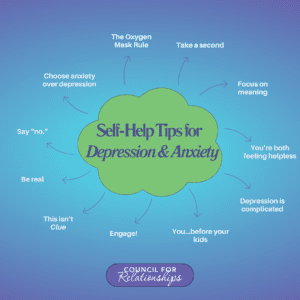Self-Help Tips for Depression and Anxiety
The holiday season can make you feel depressed and anxious. Everyone experiences symptoms of depression and anxiety during their life. But you can thrive this holiday season with the following 11 self-help tips for depression and anxiety.
11 Self-Help Tips for Depression and Anxiety
The holidays can make you feel lonely, sad, uneasy, and worried when you have to spend time with your family. But your quality of life does not need to suffer greatly, and you do not have to spend all your time in negative thoughts.
Enjoy the holiday season, whether with family members or alone, and focus on feeling good. This time of year is a great time to end bad habits and start healthy ones. For example, take a few minutes each day to practice gratitude. Studies show that practicing gratitude and being physically active can lower stress and enhance mood.
As the demands of our time continue to mount, it is important to remember to take care of your mental health.
Self-Help Tip #1: Choose anxiety over depression
One of the best self-help tips for anxiety seems illogical. Life keeps presenting us with a choice between anxiety and depression. Choose anxiety; it passes, whereas depression hangs on.
Anxiety emerges when we fear the prospect of breaking routine ways of behaving and relating. When we do the opposite of what anxiety urges, that anxiety passes. When we give in to anxiety’s demands, we feel helpless and depressed.
Self-Help Tip #2: The Oxygen Mask Rule
Caring for ourselves is imperative because no one can do it for us. Only we can take responsibility for our health, relationships, family, and work lives. If we do not take care of ourselves, others step in to do it, which sets us up for failure. This can leave us feeling intruded on and angry, not to mention making them feel helpless and resentful.
Self-Help Tip #3: Focus on meaning
We must stop focusing on making others happy (or even making ourselves happy). Happiness is a by-product of living a meaningful and satisfying life. This holiday season, focus on meaning.
Self-Help Tip #4: Depression is complicated
A combination of our biology and our emotional-interpersonal history causes depression. The emotional-interpersonal contribution to depression stems from feeling responsible for someone or something you have no control over.
Face the anxiety of giving up the illusion of control because influence is the best any of us can hope for.
Self-Help Tip #5: You before your kids
The best gift you can give your children is to take care of yourself.
When we take care of ourselves, our children will not feel that they have to care for us and can go about growing up and being themselves.
Self-Help Tip#6: Engage!
If you are feeling stuck or bored, whether in your work, relationships, or life, step forward, participate, and engage.
Self-Help Tip #7: This isn’t Clue
Relationships are not a matter of guesswork, so ask questions and speak up!
Self-Help Tip #8: Be real
Be Real. Be honest and open about your feelings and fears instead of being defensive with sarcasm or anger.
Self-Help Tip #9: Take a second
When negative emotions rise quickly and intensify in relationships, they are often unrelated to our current situation. You are experiencing a flashback: emotional elements of the past are triggering. Taking time to figure out what is setting you off, rather than blindly reacting to your emotions, is important.
Self-Help Tip #10: You’re both helpless
It cannot happen that only one person feels helpless in a relationship. In other words, just because you feel helpless does not mean your partner feels in control. Your partner may feel just as helpless but in a different way.
Self-Help Tip #11: Say “no.”
This rule appears simple (on the surface): If you can not say “no,” you can not say “yes.” Being free to say “yes” or “no” means you are free of the compulsion to do or be a certain way for others. It contributes to your responsiveness to others, particularly those closest to you.

Dr. Michael D’Antonio is a Staff Therapist and a specialist in self-help tips for depression and anxiety.
About the Author
Dr. Michael D’Antonio is a Pennsylvania therapist at Council for Relationships. If you’re having negative thoughts and feelings, it might be helpful to see him or another mental health professional.
See our Therapist & Psychiatrist Directory to find a different CFR therapist or psychiatrist near you.
More from CFR
Caring for an Aging Parent: 3 Tips to Keep You from Losing Yourself

